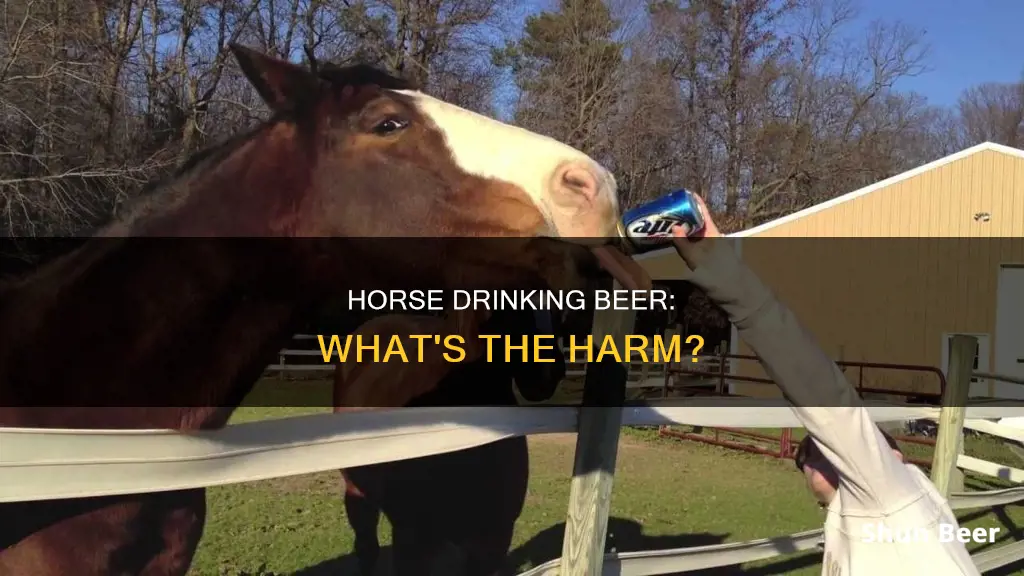
The idea of a horse drinking beer may seem amusing or intriguing, but it's a topic that delves into serious considerations of animal behaviour, physiology, and ethics. While it's a longstanding tradition for some horsemen to give their horses beer, the potential health benefits are not based on scientific evidence, and there are risks to the horse's health and well-being. So, is it ever okay to give horses beer?
| Characteristics | Values |
|---|---|
| Potential risks | Digestive issues, neurological impairment, dehydration, liver damage, behavioural changes |
| Reasons owners give beer to horses | Treatment for certain medical conditions, gastrointestinal supplement, post-workout recovery |
| Beer as a treatment for anhidrosis | Some people believe that giving a horse a can of beer a day can help treat anhidrosis, a condition that causes horses not to sweat properly |
| Yeast in beer | One strain of yeast in beer is used to formulate equine probiotics and may help stabilise the equine hindgut |
| Hops in beer | May help control gastrointestinal imbalances and prevent pasture laminitis |
| B vitamins in beer | Help the body's metabolism to function properly and generate energy, maintain healthy skin and hair coat |
| Alcohol dehydrogenase in horses | Horses produce this enzyme in their liver, which converts the alcohol in beer to simple sugars for the body to absorb |
What You'll Learn

Is beer safe for horses to drink?
The idea of sharing a beer with your horse may seem amusing or tempting, but it's important to understand the potential health implications. While some people advocate for giving horses beer, particularly as a traditional treatment for anhidrosis (a condition that causes horses to stop sweating properly), it's crucial to weigh the potential risks against any perceived benefits.
Potential Risks
Digestive Issues
Horses have a delicate digestive system that is not equipped to handle alcohol. Consuming beer could lead to gastrointestinal distress, diarrhea, and potentially life-threatening conditions like colic.
Neurological Impairment
Similar to humans, alcohol can impair a horse's cognitive abilities, coordination, and balance, leading to dangerous situations such as falls or accidents while riding or handling the animal.
Dehydration
Alcohol is a diuretic, which means it can increase urine output and lead to dehydration, especially during hot weather or strenuous activities.
Liver Damage
Prolonged or excessive alcohol consumption can strain a horse's liver, potentially resulting in liver disease or failure.
Behavioral Changes
Alcohol can alter a horse's behavior, making them unpredictable, aggressive, or docile.
Expert Insights
Equine professionals, including veterinarians, nutritionists, and experienced horse trainers, strongly advise against giving beer or any alcoholic beverage to horses. They emphasize that the potential risks far outweigh any unproven benefits.
Verdict
Based on the evidence and expert advice, it is generally not recommended to give beer to horses due to the potential health risks involved. While the tradition of giving horses beer exists, particularly in the racehorse community, it is important to prioritize the well-being of the animal and consult with a veterinarian before introducing any foreign substances into their diet.
Beer Drinking at Target Field: Family Section Rules
You may want to see also

What are the health benefits of beer for horses?
It is a well-known tradition for horsemen to give their horses beer, whether as an "old-fashioned" remedy, a gesture of goodwill, or a treat. Although there is little scientific evidence to support the practice, some potential health benefits of beer for horses include:
Nutritional Benefits:
Beer contains B vitamins, folate, niacin, and various minerals such as iron and copper. These nutrients can help with metabolism, energy generation, and maintaining healthy skin and hair. However, it is important to note that a well-balanced feed program can also provide these nutrients.
Gastrointestinal Support:
The yeast in beer, specifically Saccharomyces cerevisiae, is used in equine probiotics and may help stabilize the equine hindgut. It may also be beneficial in cases of colitis and other gastrointestinal issues. However, most commercial beers are filtered and pasteurized, which removes the live yeast cultures. Therefore, the impact on a horse's large digestive tract may be minimal.
Post-Workout Recovery:
Beer is a source of carbohydrates and vitamins that can aid in muscle recovery after strenuous exercise. The calories and nutrients in beer can provide an energy boost, although the amount in a single beer is insignificant relative to a horse's daily requirements.
Treatment for Anhidrosis:
Anhidrosis is a condition where horses are unable to sweat, which can be life-threatening in hot climates. While there is no proven treatment, some owners have reported success with giving their horses a beer a day. The yeast and B vitamins in beer are believed to help with this condition, although the effectiveness has not been scientifically proven.
While there may be some potential benefits, it is important to consult a veterinarian before giving beer to your horse. The risks associated with alcohol consumption, such as digestive issues, dehydration, and liver damage, can also apply to horses, especially if consumed in large quantities.
Calculating Safe Beer Limits: Driving and Drinking
You may want to see also

What are the risks of giving beer to horses?
While some sources claim that there are potential health benefits to giving horses beer, there are also several risks to consider. Here are some of the dangers associated with giving beer to horses:
Digestive Issues
Horses have delicate digestive systems that are not equipped to handle alcohol. Consuming beer can lead to gastrointestinal distress, diarrhea, and potentially life-threatening conditions like colic. Even though horses produce an enzyme in their liver called alcohol dehydrogenase, which helps convert alcohol to simple sugars, their digestive systems are still not designed to process significant amounts of alcohol.
Neurological Impairment
Similar to humans, alcohol can impair a horse's cognitive abilities, coordination, and balance. This can lead to dangerous situations, such as falls or accidents while riding or handling the animal. The horse may become disoriented and stumble, putting both the horse and its rider at risk of injury.
Dehydration
Alcohol is a diuretic, which means it increases urine output and can lead to dehydration. Dehydration in horses, especially during hot weather or strenuous activities, can quickly become a serious health issue. This is ironic, considering that one of the purported benefits of giving beer to horses is to encourage them to drink more liquid and prevent dehydration.
Liver Damage
Prolonged or excessive alcohol consumption can strain a horse's liver, potentially leading to liver disease or failure. While the amount of alcohol in a single beer may not seem significant to a horse's large body, regular consumption could still have detrimental effects on the liver over time.
Behavioral Changes
Alcohol can alter a horse's behavior, making them unpredictable or aggressive. This can be dangerous, especially if the horse becomes aggressive towards its handler or rider. Even if the horse becomes more docile, any behavioral changes can be concerning and impact their performance.
It's important to note that these risks can vary depending on the amount of beer consumed, the horse's size, age, overall health, and individual tolerance. However, due to the potential dangers outlined above, it is generally advised that horse owners refrain from giving their horses beer and instead focus on providing a balanced diet of hay, grains, and fresh water.
Beer and Lower GI: What You Need to Know
You may want to see also

How much beer can a horse safely consume?
While it is not recommended to give beer to horses, some horse owners do so in moderation. The amount of beer that a horse can safely consume is a highly debated topic, and opinions vary among horse owners and experts.
Some sources suggest that one to two beers a week or one beer a day is acceptable for horses. However, it is important to note that even small amounts of beer can have negative effects on horses, including digestive issues, neurological impairment, dehydration, and behavioural changes.
The potential risks associated with giving beer to horses cannot be overlooked. Horses have a delicate digestive system, and alcohol can cause gastrointestinal distress, diarrhoea, and even life-threatening conditions like colic. Additionally, alcohol can impair a horse's cognitive abilities, coordination, and balance, leading to dangerous situations during handling or riding.
It is worth noting that the amount of beer a horse can safely consume may depend on various factors, such as the horse's size, age, and overall health condition. Seeking professional advice from veterinarians or equine experts is crucial before introducing any amount of beer to a horse's diet.
While some horse owners have reported that their horses enjoy the taste of beer and may even show a preference for certain types, it is important to prioritize the health and well-being of these majestic creatures. Providing a balanced and nutritious diet, regular exercise, proper grooming, and a safe, comfortable environment are the best ways to ensure the overall health and happiness of horses.
Beer and Acid: A Safe Mix?
You may want to see also

What type of beer is best for horses?
While it is not recommended to give beer to horses, if you are going to do so, there are certain types that are considered better than others. Firstly, it is important to note that light beers are generally not suitable as they are often made with rice, which is not as appetising or nutritious for horses as barley.
The best type of beer to give to a horse is a dark, stout beer made with hops, barley, and yeast. An unfiltered and unpasteurised beer will have more beneficial active yeast cultures and B vitamins than a pasteurised one. A well-known example is Guinness, which is often recommended by horse owners to help horses with anhidrosis (a condition that causes horses to stop sweating properly). Guinness is also believed to stimulate the appetite in picky eaters and can be useful as a recovery drink after strenuous exercise.
However, it is important to remember that the potential risks of giving beer to horses can outweigh any perceived benefits. These risks include digestive issues, neurological impairment, dehydration, liver damage, and behavioural changes. Therefore, it is always best to consult with a veterinarian before introducing any foreign substances, including beer, to a horse's diet.
Centrifugal Force: Spinning Beer to Perfection
You may want to see also
Frequently asked questions
No, it is not safe for horses to consume beer or any other type of alcohol. The risks associated with alcohol consumption in horses are severe and include digestive issues, neurological impairment, dehydration, liver damage, and unpredictable behavioural changes.
Some people give their horses beer as a traditional treatment for anhidrosis (a condition that causes horses to stop sweating properly), believing it to be a source of yeast and B vitamins. Others give it as a gesture of goodwill or as a treat, or for gastrointestinal support, or as a post-workout recovery drink.
If your horse accidentally consumes beer, it is crucial to seek immediate veterinary attention. Provide your veterinarian with as much information as possible, including the type and amount of alcohol consumed, and follow their instructions.







